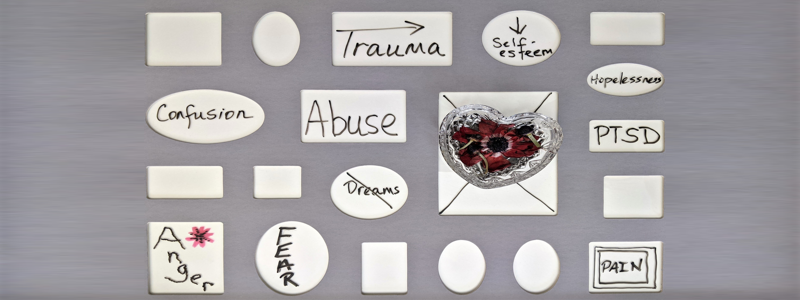Posted by Ryan House, PsyD Clinical Psychologist
Memory is one of the more highly valued cognitive capabilities. Memory is used in every day functioning and is a critical part of human development; however, what if memory was lost? What if an experience or even a period of time was simply erased? According to Eysenck and Keane (2015), repression is the concept of motivated forgetting of a traumatic experience (particularly from childhood). We will integrate the theory of repression with professional research with the intent of interpreting the link between repression and childhood trauma. While repression of childhood trauma can be a useful and even a necessary coping mechanism, unprocessed trauma can have a damaging effect on the mental, emotional, and even physical health of the individual. Processing repressed memories is critical to long term health; thus, understanding motivated forgetting and the risks of false memory associated with recovered memories is highly important during treatment.
History
As previously mentioned, modern day theory of repression is that of motivated forgetting of a traumatic experience; however, this was not always the case. According to Axmacher, Do Lam, Kessler, and Fell (2010), the original concept of repression was proposed back in 1824 by Herbart, but was later popularized by Sigmund Freud. Since the concept of repression was proposed, all the way to the modern era of thought, repression has been a point of great divide amongst cognitive theorist. According to Eysenck and Keane (2015), some of the divide centered around questions such as: how does anyone know if someone were to have repressed memories if that someone is incapable of recalling those memories, in other words, how can we prove to know what we do not know? If repressed memories are stored somewhere in the unconscious, should not science first confirm the existence of the unconscious? However, one of the more significant questions raised (which will be discussed in more detail in a later section) was how can anyone prove the validity of these recovered memories? Unless there was someone else present at the time of the traumatic event, which is willing to substantiate the validity of the recovered memory, there is no way to prove the authenticity of that memory (Eysenck and Keane, 2015). Due to the fact that the concept of repression in memory has evolved so rapidly, it is important to spend some time discussing original thought of repression compared to the modern day thought of repression.
Original Thought
According to Colangelo (2009), Sigmund Freud is located directly in the center of the controversial theory of repression in memory. Freud proposed that when a child is exposed to a significant traumatic event, that those memories are actually erased from the conscious and pushed down into the subconscious. The reason for repression in childhood trauma was debatable, but one thought was that it was the defense mechanism of the brain, as the memory of the event would be too significant and harmful to recall, it was pushed down into the subconscious (Rofe, 2008).
According to Eysenck and Keane (2015), Freud did propose the idea that repression does in fact involve an intentional and active process, but also proposed that repression sometime happens automatically. Colangelo (2009), indicated that Freud was aware that the eviction of such emotionally charged memories from the conscious level to the unconscious level did require an active mechanism and that mechanism was to be identified as repression. Original theories proposed that repression was a future indicator of severe mental illness. According to Colangelo (2009), Freud proposed the concept that neurosis had its origins in exposure to severely traumatic experiences that had occurred during childhood and were ultimately hidden from conscious awareness. It was partially because of the previously mentioned hypothesis that repression lead to severe mental illness that research on repression continued into the modern era (Colangelo, 2009).
Modern Thought
According to Rofe (2008), much of the modern debate surrounding the existence of repression is primarily focused on clarifying whether children remember or forget trauma. The cognitive psychology community is bifurcated in regards to the validity of repression. There is one side that offer harsh criticism of the theory and claim that the theory of repression needs to be completely abandoned and there is the other side that believes the psychoanalysis continues to be a central theory in psychopathology; therefore, many professionals believe that repression is a completely valid concept (Rofe, 2008). According to Colangelo (2009), after over 60 years of research on the theory of repression, the following concept of repression was suggested: “selective forgetting of materials that cause pain, not under voluntary control, and material is not lost but stored in the unconscious and can be returned to consciousness if the anxiety associated with the memory is removed” (p. 105). The professional field of psychology has not wholly embraced Colengelo’s proposed concept of repression, but he is wholly accepted as an expert in the field, therefore his opinion does carry merit.
According to Eysenck and Keane (2015), modern thought is less concerned with disproving or affirming the concept of repression, but has moved forward with the understanding that the definition of repression has evolved to being synonymous with motivated forgetting. Modern understanding is that the aspect of motivated forgetting, especially of childhood traumatic or distressing memories, could in fact serve an adaptive function. An example of an adaptive function would be reducing the anxiety of the individual. According to Eysenck and Keane (2015), the problem with motivated forgetting is that those memories are never totally forgotten. According to Van Der Kolk (2014), not only are those repressed memories never truly forgotten, but they actually stay in the mind, often times consuming the individual’s capacity for pleasure, self-control and trust. Which, leads critical analysis of repression and childhood trauma into cause and effect.
Cause
According to Axmacher et al. (2010) some of the debate over repression and idea that an individual is unable to recall a memory is due to the compelling evidence that emotionally charged stimuli (childhood trauma) are better remembered than neutral stimuli. Although the evidence for enhanced memory during enhanced stimuli is considerate, Axmacher et al. (2010) argues that the evidence does not include cases of extreme negative emotion. The argument is that when a traumatic event over-stimulates the individual’s executive capabilities, the emergence of an unconscious conflict procures in the brain. Due to this fact, conscious recall of those memories are impaired, but those memories actually continue to dwell in the memory cortex, causing an unconscious effect which dramatically negatively influences the individual’s life, i.e. panic attacks, dissociative flashbacks, or psychosomatic symptoms (Axmacher et al., 2010).
There have been multiple studies that have investigated which regions of the brain get activated during the exposure of extreme emotional stimuli (trauma). Accoarding to Axmacher et al. (2010), the conclusion of some of the studies found the actual processing of arousing stimuli relied primarily on a fast sensory processing pathway and that fast sensory processing pathway was disengaged from prefrontal control; opposed to typical memory processing, which is performed along the ventral visual stream. This discovery offers some insight into why individuals often have difficulty recalling traumatic memories in context with time and space and instead experience flashbacks. Some therapy treatments believe that it is helpful and even necessary to process the flashbacks and re-integrate the memory into the proper time and space (Axmacher et al., 2010).
According to Axmacher et al. (2010), there is a dual representation theory of repression that was presented by Brewin, which accounts for trauma-related memory distortion by proposing that memory content can either be encoded by the hippocampus-dependent mechanism or by the amygdala-dependent mechanism. If the amygdala-dependent mechanism is utilized during the processing of a traumatic event, the amygdala will not permit for conscious memory retrieval. It is important to note that the amygdala will allow for automatic recall of an unconscious experience should an associated cue appear. The dual presentation theory suggests that the amygdala and the hippocampus may restrict each other during the exposure to traumatic events which could cause the amygdala to facilitate unconscious memory processes in the hippocampus (Axmacher et al. 2010).
According to Van Der Kolk (2014), the brain from top to bottom has one priority, maintain survival. When a child is exposed to a traumatic event, the amygdala (or the smoke detector of the brain), would identify the incoming stimuli as a threat and would immediately send a message down to the brain stem and the hypothalamus. This communication engages the stress hormone system and the automatic nervous system, which produces a full body response within the child. The danger signal sent by the amygdala triggers the release of the stress hormones, cortisol and adrenaline and once the traumatic event passes (is over), the body can return to its normal state of being rather quickly. Sometimes children do not have the mental capacity to recover from this arousal state as they do not have the cognitive developmental ability to process the trauma they had just encountered. It is as these times of inadequacy that in order to maintain survival, repression may take place so that the body can stabilize and recover (Van Der Kolk, 2014).
According to Axmacher et al. (2010), a different approach to causality of repression is through the lens of social childhood development. Development of a child is significantly influenced through the child’s relationship with their security figure (parental role), maintaining the conception of security in that relationship is necessary for the child’s development of agency and stable self. Under this assumption, repression may arise when an internal conflict is unable to be integrated with the image of the security figure, e.g. child molestation by a security figure (parent, family member, etc.) (Axmacher et al., 2010).
RELATED ARTICLE: Top Stress Relief Games
Effect
The effects of repressed childhood memories are under constant debate, particularly due to the fact that a significant portion of the repressed memories that are later recalled were either predominantly false, the result of therapist suggestion, only partially true, or a combination of the three (Colangelo,2009). Although it is very difficult to validate repressed memories, the reality that the individual endures some level of negative effect from internalizing unprocessed memories, is not up to debate.
According to Axmacher (2011), the emergence of the unconscious conflict, which serves as the source of repression, and traumatic events that over stimulate an individual’s executive capabilities often times can lead to dissociation. It is that dissociation that causes conscious recall of the repressed memories to be impaired. Although the memory is impaired, the unconscious memories continue to negatively affect the individual. With the repression of internal conflicts, it is important to recognize that the repressed material does still exist in the unconscious (Asmacher,2011).
According to Rofe (2008), evolution in psychoanalysis used to interpret the effects of repression have been significant. Repression can have a significantly negative impact on the healthy adjustment of the individual, which can result in psychophysiological illnesses or even neurotic disorders. The reason for the negative results is often because of two damaging consequences which are induced through repression. First is that repressed memories can lead to the perception of a distorted reality. The distorted reality can cause the prevention of effective problem solving, which is necessary for adjustment.Secondly, repressed memories can lead to significantly increased stress or harmful tension (anxiety, fatigue, self-doubt, etc). Harmful tension, if not dealt with in a socially acceptable way (verbal expression, working out,mindfulness) may lead to the development of psychophysiological diseases or even behavioral dysfunctions (Rofe, 2008).
Effect: Reality Distortion
According to Rofe (2008), repressed memories can sometimes lead to a distorted view of reality and this distortion can lead to repressive coping styles and an illusionary perception of self. There have been multiple psychoanalys is influenced studies performed which attempt to test the impact of repressive coping styles. Through a review of the performed studies, many concluded individuals that utilized repression as a coping tool often reported low levels of anxiety, but they actually exhibited extremely high levels of psychosocial arousal. Individuals that engage in repression also tended to avoid thinking about, perceiving, and recalling any form of potentially threatening stimuli. This behavior of avoidance can significantly decrease the amount of experiences for the individual which can decrease or restrict positive emotion (Rofe, 2008).
However,there have been many additional studies that addressed the influence of repressive coping styles on individuals that did not have a psychoanalytic influence and those findings produced contradictory results. According to Rofe (2008), most studies actually found that individuals that utilized repression as a coping tool, opposed to individuals which did not utilize repression, are more well-adjusted in a wide array of psychosocial aspects. Studies found that repressors had a higher frustration tolerance, better social skills, and scored higher on educational performance. Repressors also scored higher in peer popularity and both self- and spousal satisfaction of marriage. However, the same studies also concluded that repressors had an increased difficulty in self-assertion and empathy. Repressors also had an inaccurate perception of behavior for both themselves and others (Rofe, 2008).
According to Rofe (2008), there are those theorists that characterize reality distortion as positive illusion. As previously outlined, the effects of positive illusion in the mental health community has produced some conflicting opinions. There are some that believe the positive illusion ultimately has destructive psychological consequences and is sometimes linked to narcissism and low levels of psychological adjustment. Whereas others believe that positive illusion actually increases the chances of the individual having quality mental and physical health (Rofe, 2008).
Effect: Inhibition of Tension
According to Rofe (2008), the second and more widely accepted effect of repression is the inhibition of tension. The idea of inhibition of tension is that the restraint or ignoring of negative emotions (e.g., childhood trauma), actually produces harmful tension which leads to subsequent harmful behaviors and also increases the chances that the individual will present with various mental and physiological illness later in life. According to Van Der Kolk (2014), repression of traumatic events can have a detrimental impact on the mind and the body. There is not a significant controversy over the concept that tension inducing items should be released, but there is much controversy over the methods used to release or recall these repressed memories. The controversy around recall of repressed memories leads directly into the concern of and treatment for repressed memories.
Treatment / Concern
According to Eysenck and Keane (2015), repression and the concern of treatment is intertwined. The overwhelming critique or concern with repression is the fact that when these repressed memories are actually recalled, the majority of those memories are either completely false or largely false. According to Hyman, Husband, and Billings (1995), the recall of false memories is highly prevalent with individuals that suffered a childhood trauma and have engaged repression (motivated forgetting) as a coping mechanism for that trauma. The concern of false memories is that the individual that endured an actual childhood trauma could be recalling events that never actually happened, which could not only reinforce the trauma, but could actually increase the negative symptoms procured by that trauma as the recalled (false) memory could be worse than the actual event (Hyman et al., 1995).
According to Eysenck and Keane (2015), there are two avenues which repressed memories can be recalled: spontaneous recovery and recovered in therapy. Studies suggest that most recovered memories inside of a therapeutic session are often false memories. The argument is that the memories produced inside of therapy are predominantly manufactured through the suggestions of the therapist. The therapist can often times find themselves in a position of emposing forced discovery as the individual is presenting with a childhood trauma, however through the action of motivated forgetting, they have repressed those memories. In the attempt to recall those memories, so that they can be processed in therapy, the therapist may visually walk them through a similar traumatic scenario in hopes of triggering the recall of those repressed memories.
According to Eysenck and Keane (2015), the second way to recall repressed memory is through spontaneous recovery. Spontaneous recovery of repressed memories is simply the idea that forgotten (repressed) memories are randomly triggered and recalled, outside of a therapeutic session. Studies show that memories recalled outside of therapy are much more likely to be genuine memories. One of the major problems with spontaneous recovery is that there is no way for the individual to anticipate the recall of a memory, nor can they anticipate the impact of the memory. Some recalled memories can be intense and even crippling to the individual which can lead to fears and even phobias of enduring an additional spontaneous recall (Eysenck and Keane, 2015).
According to Rofe (2008), there is some research that shows that the certain methods of recall of repressed memories (hypnosis) can even produce confabulations, such as memories from previous lives. Rofe (2008), also argues that some psychodynamic therapists may actually be putting their client at risk for the development of false memories. There are some professionals that believe the production of false memories is so prevalent and significant that a new category of behavioral disorder should be considered; false memory syndrome. This argument just adds to the skepticism regarding the validity of the recovery of repressed memories.
Conclusion
Albeit controversial, the concept of repression will have a home in cognitive and affective theory for some time to come. Although the concept of repression was initially proposed as an explanation for the development of mental disorders and has sense been almost wholly abandoned, repression has planted some roots in cognitive theory as an explanation for physical illnesses. Much of the industry has embraced the concept of repression as motivated forgetting as the mind plays an active role in pushing dangerous or traumatic memories to the unconscious. Motivated forgetting is especially common in children which have been exposed to a traumatic event as many cognitive theorist believe that the brain development of a child is sometimes not capable of processing such a significant event. Acknowledging that these memories may exist and being aware of the potential damage internalizing those memories can cause, advances the debate of recall.
Although most evidence suggests that repressed memories that are recalled in therapy are often times false and can ultimately cause further harm to the individual, the risks associated with spontaneously recovery are also necessary to consider. In consideration with childhood trauma, the overwhelming consensus is that the repressed memories should be processed professionally immediately following the traumatic event; unfortunately, early processing of childhood trauma is very rare. While repression of childhood trauma can be a useful and even a necessary coping mechanism, unprocessed trauma can have a damaging effect on the mental, emotional, and even physical health of the individual. Processing repressed memories is critical to long term health; thus, understanding motivated forgetting and the risks of false memory associated with recovered memories is highly important during treatment.
References
Axmacher, N., Do Lam, Anne T A, Kessler, H., & Fell, J. (2010). Natural memory beyond the
storage model: Repression, trauma, and the construction of a personal past. Frontiers in
Human Neuroscience, 4, 211. doi:10.3389/fnhum.2010.00211
Colangelo, J. J. (2009). The recovered memory controversy: A representative case. Journal of
Sexual Abuse, 18, 103-121
Eysenck, M. W., & Keane, M. T. (2015) Cognitive psychology: A student’s handbook (7th ed.).
New York, NY: Psychology Press. ISBN-13: 978-1848724167
Hyman Jr., I. E., Husband, T. H., & Billings, F. J. (1995). False Memories of Childhood





